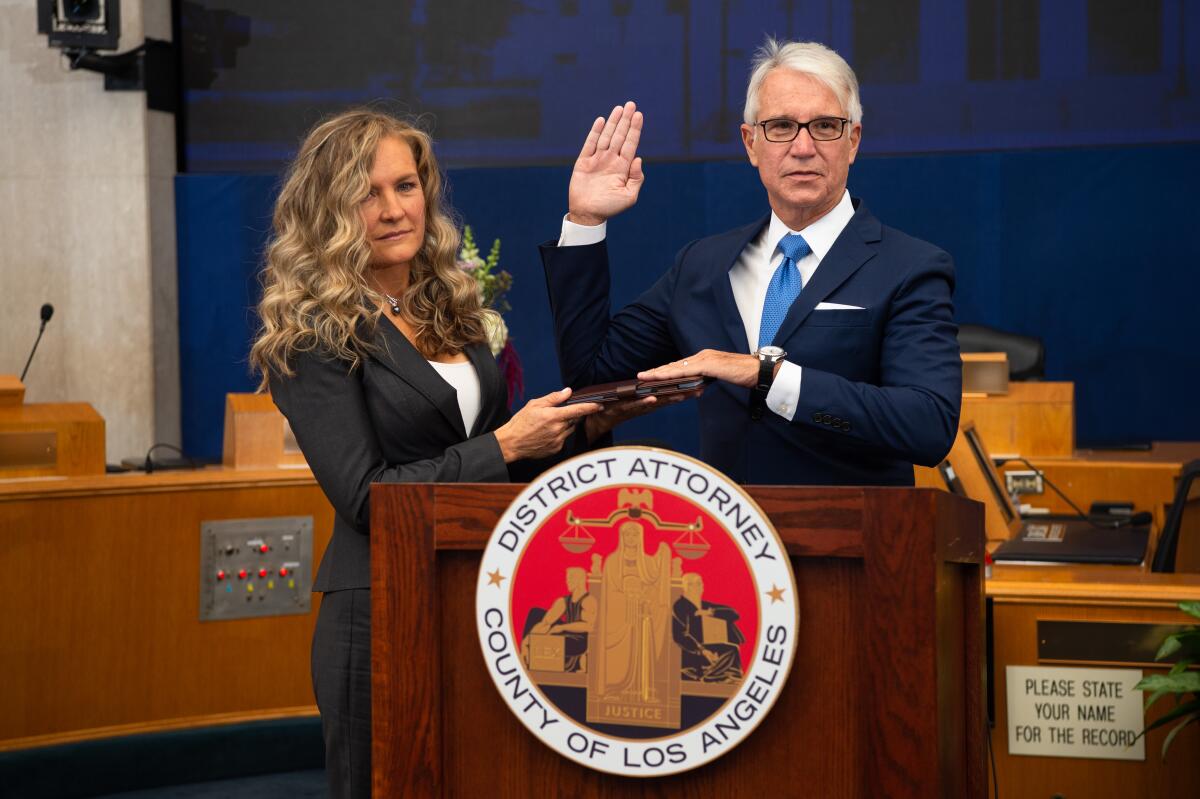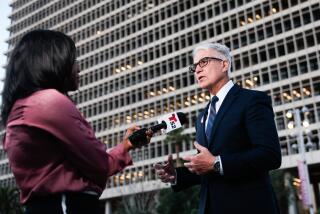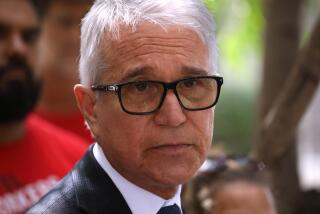D.A. George Gascón’s new vision for taking on L.A. County gangs draws confusion, criticism

Los Angeles County Dist. Atty. George Gascón says he’s going to fundamentally change the way the largest prosecutor’s office in the nation handles gang crime.
After weeks of rumors that he would eliminate the office’s Hardcore Gang unit — long a treasured spot for veteran prosecutors hoping to take on some of the most violent crimes in Southern California — Gascón finally confirmed Tuesday the unit would be reduced in size, renamed and reorganized.
The new Community Violence Reduction Division will “integrate the most serious gang crimes and most prolific violent offenders with prevention, intervention and community involvement efforts,” according to a copy of an internal memo reviewed by The Times. The new unit will have 26 prosecutors, as opposed to the 40 who staffed the prior unit, officials said.
Dist. Atty. George Gascón announces sweeping policy changes for cash bail in L.A. County and bans seeking sentencing enhancements in nearly all cases.
Prosecutors assigned to the new unit will focus on areas that the Los Angeles Police Department has determined to be “violence prone,” starting with the Foothill, 77th Street and Newton divisions, according to the memo and a news release Gascón issued Tuesday.
Representatives for the LAPD did not respond to multiple requests for comment.
“Unless we have a community-based solution to the problem, we’re not going to create a sustainable answer,” Gascón said during a news conference earlier this month, adding that the new unit will shift away from a “purely prosecutorial model.”
Gascón and others have touted the move as part of a broader cultural shift that will lead the nation’s largest prosecutor’s office to put as much effort into rehabilitation and crime prevention as it does toward punishment. But some of Gascón’s own line prosecutors have questioned the timing and execution of the move.
A law enforcement official with direct knowledge of the changes said prosecutors were first informed that the Hardcore Gang Unit would undergo a dramatic change during meetings in March, but were offered few specifics. In the weeks that followed, Gascón’s office declined to answer specific questions about the changes to the unit from multiple news outlets. In that time frame, Gascón held a pair of public events, including a news conference to lend support to a piece of legislation, but still offered only sparse details about the changes.
“There was no guidance about what the people left behind in [what was] Hardcore were going to be doing,” one prosecutor said. “No job description. No mission statement.”
Gascón issued a memo formally announcing the changes on Tuesday and said he hoped to expand the practice of embedding prosecutors in LAPD divisions to other law enforcement agencies throughout the county. It’s unclear how that will work in large swaths of the county patrolled by the L.A. County Sheriff’s Department, as Sheriff Alex Villanueva is publicly supporting efforts to recall Gascón and recently told KTTV-TV News he has spoken to the D.A. just once since December.
In an interview with The Times last week, Gascón said the new unit’s core mission is to approach violence “through a public health lens,” noting that he plans to partner with gang intervention workers and service providers, though he didn’t name specific vendors.
“The goal here is, eventually, not only for the D.A., but also the police, to become sort of a supporting role and have the community and county public health be the leading role,” he said, noting that his office would step in when “there needs to be a prosecution.”
News of the changes to the unit have infuriated some veteran prosecutors, who say the shift was poorly thought out and poorly timed as homicides and gang violence are on the rise in Los Angeles. The unit primarily prosecuted murders and attempted murders involving documented gang members.
The number of homicides in Los Angeles rose above 300 for the first time in a decade last year, and the LAPD considers many of those slayings to be gang-related. At least 60 of the 105 homicides that had taken place in Los Angeles as of April 20 were believed to be connected to gang activity, police officials have said.
“You have 700 open cases. Gang crimes and gang murders on the rise, and you expect 26 prosecutors to handle all of those cases?” asked Eric Siddall, vice president of the union representing line prosecutors who has been a frequent critic of Gascón. “It’s absurd.”
Some Hardcore Gang unit prosecutors are being allowed to keep their cases as they transition into new jobs, while others will be handing off active murder prosecutions to other deputy district attorneys, according to the official and the memo reviewed by The Times.
“You could imagine a murder case that is kind of halfway in progress suddenly gets dropped on a D.A. who has never touched it … how is that going to play out?” one prosecutor connected to the Hardcore Gang unit asked. “Will the case suffer as a result? That’s the concern.”
Gascón downplayed complaints about the reduced size of the unit, noting that prosecutors assigned to the Community Violence Reduction Division will function as “boots on the ground,” gathering information on cases, while prosecutors outside the unit might actually take those matters to trial.
The changes are part of Gascón’s broader mission to reduce reliance on incarceration and seek outcomes that favor rehabilitation over punishment. In announcing a policy barring prosecutors from using sentencing enhancements in nearly all cases last year, Gascón cited gang enhancements as among the most problematic, often filed against defendants accused of crimes that have nothing to do with their alleged gang status.
Gascón believes gang cases are prosecuted more aggressively than others and said he believes changing the unit’s mission, and name, might help repair fractured trust between law enforcement and communities in L.A. County that often complain of being overpoliced.
“The model of Hardcore Gang … you create a model that, first of all, even the name itself, it’s sort of this connotation of us against them. Bad guys, good guys,” he said. “There’s increasingly a disconnect with the communities that we serve.”
Defense attorneys have long criticized the unit as a magnet for ambitious prosecutors who wanted to rack up convictions and seek promotion within the office.
Alexandra Kazarian, a former public defender who now does criminal defense work with the firm of famed Los Angeles attorney Mark Geragos, said defense lawyers used to derisively refer to plea deals from Hardcore Gang prosecutors as “38 Specials,” because they so often would result in defendants spending at least 38 years in state prison.
“If George is now trying to add in services, if he’s injecting services into this new unit, it may mean he’s trying to take away the idea that this is a unit where you get convictions and you go to trial as a default,” she said. “I like the way that sounds, not because I want gang members to get off, but because it’s nearly, truly, impossible to get a fair shake for somebody when you’re trying a case against Hardcore.”
Times staff writer Kevin Rector contributed to this report.
More to Read
Start your day right
Sign up for Essential California for news, features and recommendations from the L.A. Times and beyond in your inbox six days a week.
You may occasionally receive promotional content from the Los Angeles Times.








